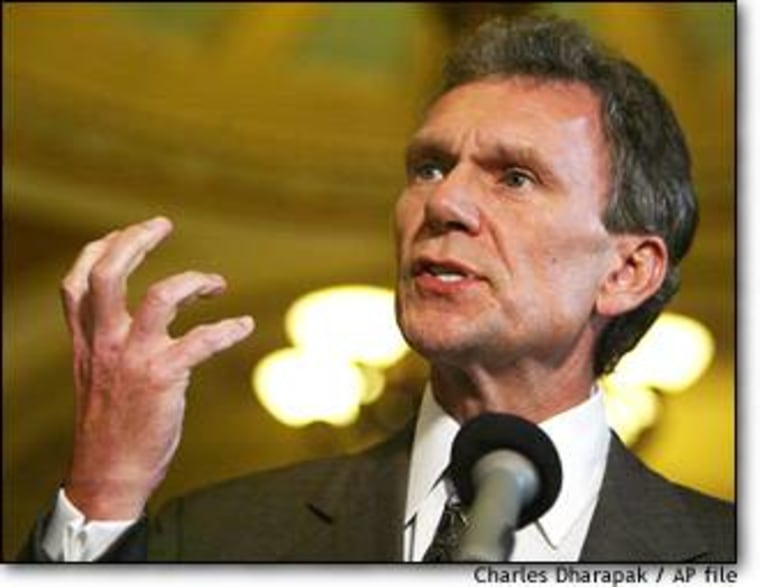The culture war between the Red and Blue Nations has erupted again — big time — and will last until Election Day next year. Front lines are all over, from the Senate to the Pentagon to Florida to the Virginia suburbs where, at the Bush-Cheney ’04 headquarters, they are blunt about the shape of the battle. “The country’s split 50-50 again,” a top aide told me, “just as it was in 2000.” Translation: They can’t win re-election by wooing the (mostly coastal) Blue states, but only by firing up (mostly non-coastal) Reds.
The abortion issue is skirmish No. One. The Republican, conservative pro-life (Red) forces have succeeded not only in winning one for their side, but in dividing the Democrats. When the Senate voted in favor of a ban on so-called “partial birth” abortion, 17 Democrats joined the GOP in the 64-vote majority. Indeed, the Senate’s top Democratic leaders — Tom Daschle and Harry Reid — voted to ban the procedure, as did two Democrats who had considered running for president this year, Evan Bayh and Joe Biden.
Bayh and Biden didn’t enter the race for a number of reasons, but one of them was abortion. Pro-choice forces have such a grip on the early stages of the nominating process that, to run for the Democratic nomination, it would be next to impossible to support the partial-birth ban. Indeed, Dick Gephardt and Dennis Kucinich, past supporters of the ban, switched positions before entering the race.
Whatever else President George W. Bush does or doesn’t do on cultural issues, his willingness to sign this measure (vetoed twice by President Clinton) will make him a hero in the Red State “base.” In the old days, the one issue that united the conservative heartland of the GOP was hatred of Communism. These days, the unifying thread — merging evangelical Christians, conservative Catholics and many Orthodox Jews — is opposition to abortion.
Among the places the GOP will use the issue with special intensity are those where Democratic senators voted for the “partial birth” ban. A good example is Nevada (home of Harry Reid), which Al Gore lost narrowly to Bush, but where the rapid growth of the Hispanic (Catholic) population gives the Republicans a chance to solidify its conservative “pro life” message.
The pro-life message is appealing not only to conservative Catholics but to evangelical Christians and Orthodox Jews who, in recent years (and with the encouragement of the GOP) have become activists on what had been a Catholics-only issue.
Fear of the latent power of that same coalition is the logical explanation for why the Pentagon — and the president — have not penalized Lt. Gen. William G. “Jerry” Boykin for his incendiary remarks. In a series of recent speeches at evangelical Christian churches, the general, recently appointed undersecretary of Defense for intelligence, depicted the war on terrorism as a fight against a “spiritual enemy,” and branded as idolatrous the Muslim faith of a militia leader he fought against as a field commander in Somalia in 1993.
The remarks have caused a predictable firestorm in the Arab and Muslim press — and generated a cascade of negative editorials in American newspapers, too. But even though Bush distanced himself from Boykin’s remarks on Wednesday, a top aide to Defense Secretary Donald Rumsfeld said the general would not be fired.
Why? Well, Boykin was literally preaching to the choir. Many evangelical Christians believe that the war on terrorism is a battle between good and evil — a battle predicted in the Bible as a precursor to the End of Days and the Second Coming. Even if they don’t believe it in a strict scriptural sense, many Christians — led by preachers such as Franklin Graham — see Islam as a problematic faith, at best. Firing Boykin would, in these eyes, be seen as a capitulation.
The last thing Bush wants is to make a martyr of a man who depicts himself as a Christian Soldier, marching off to war. If Boykin has to go, Bush’s handlers will arrange it to look like a mass execution by the Washington mob — a mob the president had no choice but to mollify. In other words, they’ll pin it on the Democrats.
By the way: I take the White House’s handling of Boykin to mean that Karl Rove’s game plan for 2004 doesn’t include Michigan, which has the nation’s largest, most vibrant and political Arab-Muslim community.
The president isn’t the only Bush working the Red State voters hard on cultural issues. His brother is, too. In Florida, at Gov. Jeb Bush’s urging, the Legislature empowered him to order the resumption of tube feeding to a severely brain-damaged woman named Terri Schiavo, who had been in a vegetative state for 13 years. The governor sided against Schiavo’s husband and with her parents, who wanted her kept alive. More important, Bush sided with anti-euthanasia forces, who share many ties and sympathies with those who oppose abortion.
As a family, the Bushes are making a political and moral statement: We are for the sanctity of life, as the Catholic Church defines it, and against legal powers that would extinguish it. (Except in the case of the death penalty, which the church also opposes.)
If it sounds like a Holy War at home it is, and the Bushes are hoping that red is the color not just of blood but of victory.
Howard Fineman is Newsweek’s chief political correspondent and an NBC News analyst.
